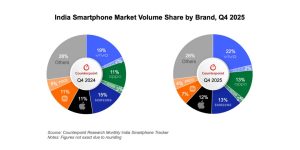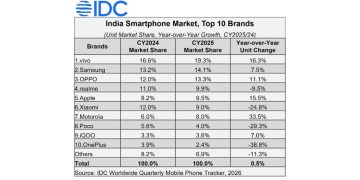In a significant achievement, India now stands at 47th place worldwide in Speedtest’s Global Index rankings for mobile internet speed. This rapid ascent has positioned India ahead of several G20 countries, including the UK (62nd), Brazil (50), Mexico (90), and Japan (58). Notably, India has outperformed neighboring countries like Pakistan, Nepal, and Sri Lanka in mobile internet speeds.
Massive Boost in Median Download Speeds
Ookla, a global leader in internet testing and analysis, reports that India’s median download speed has shown remarkable improvement, surging by a staggering 3.59 times since the introduction of 5G. In October 2022, India’s median download speeds ranged from 10.37 Mbps in the North East to 21.49 Mbps in Jammu and Kashmir. However, by August 2023, the range of median download speeds had significantly expanded, with every region clocking speeds exceeding 28 Mbps.
5G Adoption Spurs Speed Surge
The substantial improvement in India’s mobile internet speeds is attributed to the widespread adoption of 5G technology in the country. Major carriers like Jio and Airtel have played pivotal roles in rapidly expanding 5G coverage across major urban areas and beyond.
Impressive 5G Download Speeds
In October 2022, nine telecom circles, including Andhra Pradesh, Kolkata, North East, Haryana, Rajasthan, Bihar, Punjab, Kerala, and Uttar Pradesh West, recorded median 5G download speeds below 100 Mbps during the early phase of 5G implementation. However, by August 2023, the median 5G download speeds surged to an impressive 240 Mbps across all telecom regions. Kolkata emerged as the leader with a median download speed of 385.50 Mbps.
Enhanced Customer Satisfaction
The report highlights that the adoption of 5G has led to a notable increase in the Net Promoter Score (NPS), a metric that measures customer satisfaction. Users of 5G networks rated their network operators higher compared to 4G LTE users.
Alleviating 4G Congestion
Despite Indian users being among the world’s most data-intensive consumers, 4G networks struggled to meet the high demand, resulting in network congestion. However, the rollout of 5G and spectrum allocation has enabled operators to offload 4G traffic onto 5G networks, significantly reducing congestion. Ookla reports that 25% to 35% of traffic is already being offloaded from 4G to 5G, resulting in a smoother mobile internet experience for users across India.













































































































































































